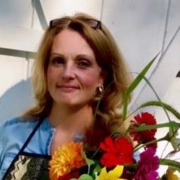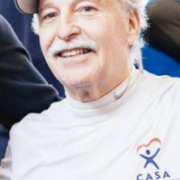In remarks he wrote to share with his mom and the court the day his case closed, Lucas had something he needed his mother Malina to know.
“I never thought you’d be the mom I needed, but now you are.”
They were words that at the onset of his case likely no one expected to hear.
Malina’s youngest son, Mattie, was the first to come to the attention of the court. He was not even a year old and he’d been brought to the hospital more than once suffering from severe respiratory distress due to a medical condition.
Though she’d been taught how to manage his condition and informed of the signs of early respiratory distress, Malina’s addiction to drugs was preventing her from getting her young son the help he needed in an appropriate manner, and Mattie’s dad was incarcerated, so he was placed into foster care with a local family.
Malina’s five older children, including then 15-year-old Lucas, were in the care of her sister who’d taken the children in over the years without the involvement of the child protection system.
From the outset of the case, it was clear. For Mattie to return home Malina would need to get sober, find employment and be able to provide a safe, stable home for herself and Mattie.
She understood the plan, and Mattie’s CASA Margaret believed all along the way Malina wanted to be a mother to her son, but sadly her addiction got in the way. For Malina, like many people dealing with substance misuse disorders, recovery was a rollercoaster.
She got into one program and was kicked out for a positive drug screen. She got into another program and the same happened.
In the meantime, Lucas’ life with his aunt out of state had deteriorated and she’d kicked him out. A petition against Malina was opened in the teenager’s case and he was placed in foster care. Lucas, dealing with his own struggles, was placed in a group home, from which he was removed after just a short time, for failure to follow the rules. He moved into a new program, while a search for a foster placement was conducted. Hesitant to take on the case of an understandably defiant teenage boy, Margaret stepped in as his CASA, now seeking the best supports she could find to help stabilize his life.
While recovering at Cynthia Day Family Center in Nashua, Malina had finally come to a point where she was able to have Mattie live with her for multiple days at a time, while he remained in foster care on the other days. Both Mattie and Malina showed signs of benefiting greatly from the visits. Their bond deepened and Margaret could see that Malina loved her son and that he did well in her care, but she had her concerns about Malina’s ability to stay sober. After a weekend away from the center, Malina tested positive for a drug screen and was kicked out. Though she was able to get into another program and start again, Margaret’s concerns remained the same.
For the next few months, Mattie’s case moved toward termination of parental rights. The foster home he had been in since the beginning was a pre-adoptive home and Margaret was recommending that while Mattie loved his mom and she him, it did not appear Malina could provide the safe, stable home he needed. Her recommendation was that Mattie be adopted. DCYF, she thought, believed the same. But by the time the permanency hearing came around, DCYF’s recommendation had changed to reunification.
Malina, they said, was doing very well in recovery and had been for a couple months.
Margaret maintained her position but ultimately, the court decided to allow the case to move down the path toward reunifying Mattie and Malina.
Over the next period of months, Malina continued to thrive in recovery. After a successful completion of the program she was in, Malina was able to secure an apartment and a job. Lucas, now 17, was the first to return to his mother’s care. Though his struggles continued in school, he started playing basketball for his high school team and his skills drew the interest of a New England college coach.
A couple months later, Mattie left his foster home and moved back with Malina and Lucas. He continues to thrive in the care of his mom, his medical condition is being well-managed and Malina and Mattie continue to have a relationship with the foster family who bonded with him over the two and a half years he was in their care.
Prior to the case closing, with an incredible support system she has built up around her family, Malina was able to welcome her four other children home.
In court on that final day of the case, Malina shared her own words with those who’d been with her through her journey. She thanked the judge, the caseworkers who had Mattie and Lucas’ cases and Margaret for being so hard on her, for without that, she would not have been able to be that mother Lucas told her she finally was for him, and for Mattie.




 When CASA volunteer advocates graduate training, they are automatically assigned what is called a “Program Manager” in their region. Program managers are CASA staff members who provide supervision, support and ongoing training for volunteer advocates. Meet Jerry Larson, a program manager out of the Laconia office who supervises volunteers working in the Laconia, Ossipee and Conway family courts.
When CASA volunteer advocates graduate training, they are automatically assigned what is called a “Program Manager” in their region. Program managers are CASA staff members who provide supervision, support and ongoing training for volunteer advocates. Meet Jerry Larson, a program manager out of the Laconia office who supervises volunteers working in the Laconia, Ossipee and Conway family courts.
 As a new CASA, accepting your first case can be daunting. CASA volunteer advocate Laurel Appleton walks us through how she found her comfort zone on her first day of court, and how it led her to apply to be a peer coordinator, a designated mentor for new volunteers.
As a new CASA, accepting your first case can be daunting. CASA volunteer advocate Laurel Appleton walks us through how she found her comfort zone on her first day of court, and how it led her to apply to be a peer coordinator, a designated mentor for new volunteers.
 Steve Friedman is a passionate, committed volunteer and friend to CASA. Between serving on the Snowfest committee, providing marketing opportunities through his position at The River 92.5 radio station, and networking on behalf of CASA near and far, he is truly a gift to the organization.
Steve Friedman is a passionate, committed volunteer and friend to CASA. Between serving on the Snowfest committee, providing marketing opportunities through his position at The River 92.5 radio station, and networking on behalf of CASA near and far, he is truly a gift to the organization.